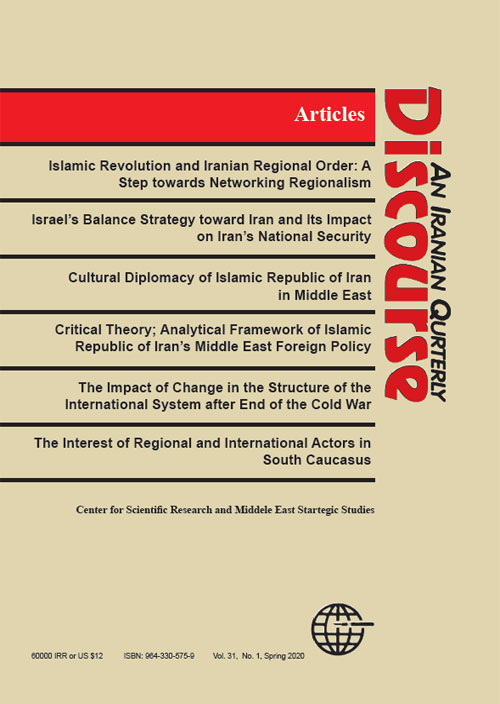Critical Theory; Analytical Framework of Islamic Republic of Iran’s Middle East Foreign Policy
Investigation of Iran’s foreign policy from the standpoint of international relations theories should be regarded as a topic being scrutinized in recent years, and each of the theories in turn contains its own strong points and weaknesses. Since the critical theory regarding international relations has not been well the focus of studies – an evidence of which is scarce studies on Iran’s foreign policy -- this article tries to examine Iran’s foreign policy on the Middle East in the post-Islamic Revolution era. This study tries to fulfil its goal through checking correspondence of theory with the specific case with respect to the critical theory of international relations. This research will take assumptions and concepts of the said theory on the axis, trying to gauge its effectiveness in analyzing the foreign policy of the Islamic Republic of Iran in the Middle East. For the same purpose, this article takes an analytical-explanatory approach to address the question, “How the critical theory of international relations can analyze Iran’s foreign policy on the Middle East in the post-Islamic Revolution era?” In another words, “Is Iran’s foreign policy on the Middle East in the post- Islamic Revolution era consistent with the critical theory of international relations?” To answer this question, this research assumes that from the perspective of critical theory of foreign policy, governments in the international system must be oriented to accountability and be revisionist so as to get rid of the hegemonic domination and unfair international structure to establish the desired condition of justice. It should be noted that the assumptions considered in this research are in line with the Islamic Seyed Javad Salehi1 Mohsen Keshvarian Azad2 Abstract Critical Theory; Analytical Framework of Islamic Republic of Iran’s Middle East Foreign Policy 92 Republic of Iran’s foreign policy on the Middle East in the post-Islamic Revolution era. Therefore, by applying the principles and assumptions of the critical theory and by outlining their commonalities, the researchers will provide an objective and systematic picture of Iran’s foreign policy in the Middle East.
- حق عضویت دریافتی صرف حمایت از نشریات عضو و نگهداری، تکمیل و توسعه مگیران میشود.
- پرداخت حق اشتراک و دانلود مقالات اجازه بازنشر آن در سایر رسانههای چاپی و دیجیتال را به کاربر نمیدهد.




